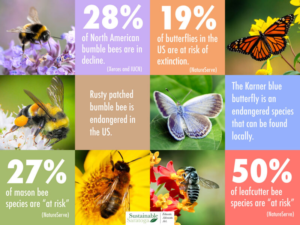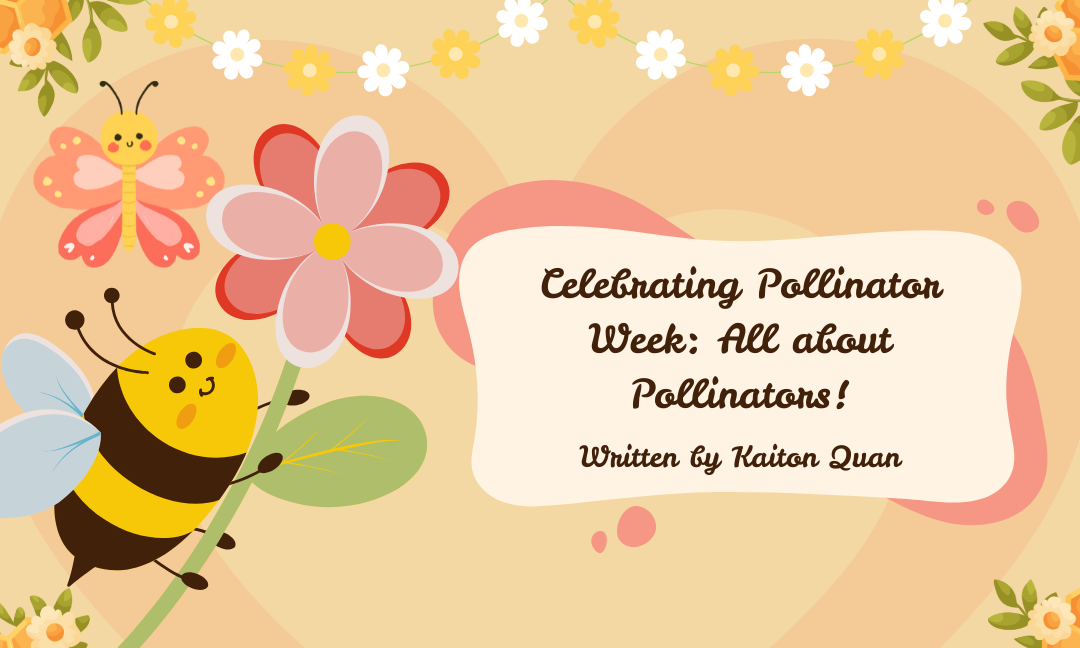Written by: Kaiton Quan
Designed by: Suhana Shaik
Edited and Published by: Andrew Jackson
Why does their impact matter?
Without bees and butterflies, one of nature’s most essential services, which is pollination, would never exist. Without them, much of the food we eat, and most of the nature we see around, would disappear. Pollinators may be small, but their impact is massive. Their populations are declining globally, so understanding their role is urgent, if we want to preserve the earth and the foods we eat.

What are pollinators?
Pollinators are animals that move pollen from one flower to another, helping with plant reproduction. The most popular pollinators are bees, but some other pollinators that may not be as well known as bees would be butterflies, moths, beetles and birds (such as hummingbirds). Each of these pollinators play a different role in different ecosystems and environments.
Pollinators and our food system
About 75% of this world’s flowering plants and 35% of global food crops depend on animal pollinators to reproduce. This includes crops like apples, strawberries, and blueberries. Crops such as cucumbers and squash, and almonds and coffee, also rely on pollination to reproduce. Without pollinators, these foods would be scarce, lower in quality, or disappear from our plates entirely.

Environmental Importance
Beyond agriculture, pollinators are key to survival of wild plants, which in turn support ecosystems by providing habitat, food, and oxygen. Pollinators are deeply intertwined into food webs, supporting all kinds of wildlife. When pollinators thrive, biodiversity thrives. Pollinators help maintain the balance of our ecosystems.
What’s threatening pollinators?
Despite the importance of pollinators, their population is decreasing. A few things that can be considered major threats could be pesticides, habitat loss such as deforestation, climate change, and invasive species.
What can we do?
Protecting pollinators is simple and easy, you can just plant native pollinator gardens, avoid harmful pesticides such as chemical ones and support local beekeepers. A few other things you could do to protect pollinators could be to educate someone about them, whether it be your kids or maybe a special lesson in class, it’s every thought that matters.
Conclusion
Pollinators are unsung heroes of our food system and environment. Their survival is linked with ours, and protecting them means protecting the future of food and natural beauty. As individuals and communities, we have the power to make a positive impact. Let’s ensure the buzz doesn’t go silent.
Works Cited
- “About Pollinators.” Pollinator.org, https://www.pollinator.org/pollinators. Accessed 30 May 2025.
- “The Importance of Pollinators | Home.” USDA, https://www.usda.gov/about-usda/general-information/initiatives-and-highlighted-programs/peoples-garden/importance-pollinators. Accessed 30 May 2025.
- “Overview of Bee Pollination and Its Economic Value for Crop Production.” PubMed Central, https://pmc.ncbi.nlm.nih.gov/articles/PMC8396518/. Accessed 30 May 2025.
- Randall, Brianna. “The Value of Birds and Bees.” Farmers.gov, 22 June 2020, https://www.farmers.gov/blog/value-birds-and-bees. Accessed 30 May 2025.
- “Threats to pollinators | U.S. Fish & Wildlife Service.” U.S. Fish and Wildlife Service, 16 May 2023, https://www.fws.gov/initiative/pollinators/threats. Accessed 30 May 2025.

